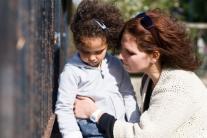Professor Paula Zeanah, Research Excellence Award for 2019-20 recognizing her exceptional scholarship in her home Co
Resources to help children in the aftermath of a hurricane
Thu, 09/14/2017 - 9:22amThe devastation caused by hurricanes can be overwhelming to anyone, but poses unique challenges for children. Compared to adults, children suffer more from exposure to disasters--including psychological, behavioral, and physical problems, as well as difficulties learning in school.
While a nationally representative study found that 14 percent of children in the United States (ages 2-17 years) have experienced a disaster, most will never have direct experience. However, even those who hear about a disaster or see images on television may show symptoms of posttraumatic stress disorder (PTSD), depression, and anxiety. Psychological impacts on children are particularly likely to reverberate after a disaster.
Children's reactions to hurricanes differ-some exhibit little distress, others have short-term difficulties, and still others struggle with long-term mental health problems. In most cases, children's negative responses to disasters decrease over time. For example, 2-3 years after Katrina, more than 72 percent showed signs of resilience or recovery. How children respond to disasters is influenced by several factors, including their individual experiences, age and stage of development, reactions of parents and other caregivers, previous exposure to trauma, and the presence of other risk and protective factors in their lives.
There are many excellent resources to help children recover from hurricanes and other natural disasters (see below). Several common themes emerge from these resources and other research:
- Understand that trauma reactions vary widely. Children may regress, demand extra attention, and think about their own needs before those of others-natural responses that should not be met with anger or punishment.
- Remember that the presence of a sensitive, nurturing, and predictable adult is one of the most important factors to children's well-being following a disaster.
- Create a safe environment where children's basic needs (shelter, food, clothing) are met, and routines exist to provide children with a sense of safety and predictability (e.g., regular schedules).
- Keep children busy. Boredom can intensify negative thoughts and behaviors, but children are less like to experience distress when they play and interact.
- Limit children's exposure to images and descriptions of the disaster (e.g., media and adult conversation). Talk with children about what they see and hear.
- Make sure that adults and other caregivers receive the necessary attention, support, and care.
- Seek professional help if a child's difficulties do not improve. The National Child Traumatic Stress Network (NCTSN) recommends seeking help if problems persist longer than six weeks after a hurricane.
- Find age-appropriate ways for children to help. Even very young children benefit from being able to make a positive difference in others' lives while learning important lessons about empathy, compassion, and gratitude.
- Emphasize hope and positivity. Children need to feel safe, secure, and positive about their present and future. Seeing and hearing stories of people helping people in difficult times is both healing and reassuring.
The last point about reminding children about hope and goodness may receive less attention, but it is critically important. Stories to share with children are numerous-after Harvey landed in Texas, restaurant employees used kayaks to deliver free pizzas to people without food, people formed a human chain to save an elderly man from flood waters, and an animal advocacy organization reunited pets with their owners. As former President Jimmy Carter said in Harvey's aftermath, "When the waters rise, so do our better angels ... Pick a past disaster, and I'll tell you at least a dozen stories that stand as living testaments to our collective compassion, generosity-and unity."
Our hearts go out to the many people impacted by hurricanes Harvey and Irma, and to those who have previously endured a disaster or are bracing for one in the future.
Helpful resources for children and caregivers:
- The NCTSN has resources for helping children through different types of disasters.
- The Substance Abuse and Mental Health Services Administration has a guide for adults for talking with children and helping them cope after a disaster.
- The Centers for Disease Control and Prevention and National Institute of Mental Health offer tips for parents to help youth cope with disaster.
- The American Academy of Pediatrics published "Talking to Children About Disasters," available in English and Spanish (can be read aloud).
- The American Red Cross developed a booklet for parents and other caregivers on how to be prepared for a disaster and how to help children cope.
- Zero to Three recently developed a resource for parents of young children who were displaced by Hurricane Harvey.
- Scholastic and Forbes have compiled lists of children's books.
- Child Trends has several resources on the broader topic of child trauma, including recommendations for early care and education for helping young children exposed to trauma, an overview of how trauma-informed care can support children's development, research findings on trauma-informed care for youth in foster care, and the effects of trauma on child migrants and refugees.
Citation:
Bartlett, J. D. (2017, September 08). Resources to help children in the aftermath of a hurricane. Retrieved September 14, 2017, from https://www.childtrends.org/resources-help-children-aftermath-hurricane/

